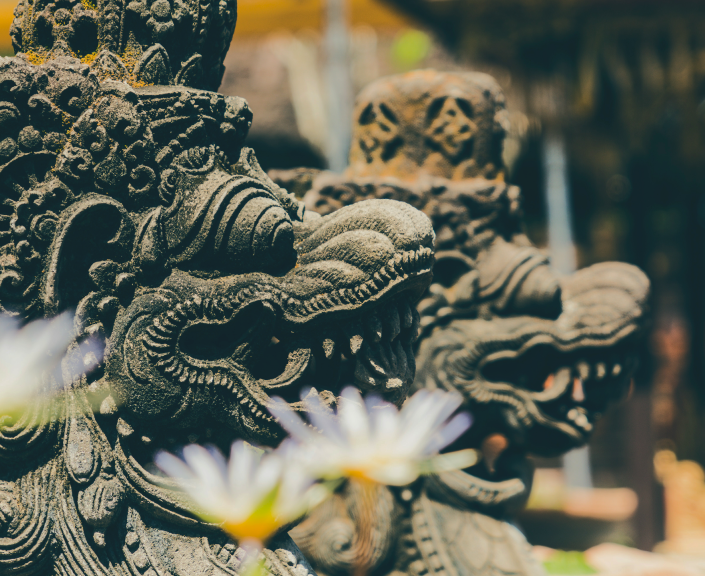THE BALINESE CULTURE
Discover the culture of "The island of the Gods"


Balinese Culture : A Living Legacy
On the island of Bali, culture is not just an abstract concept, but a living reality that permeates every aspect of daily life. This small Indonesian island, nicknamed "the island of the gods", is home to a unique society where ancestral traditions and modernity coexist in a delicate balance.
At the heart of Balinese culture is Balinese Hinduism, a unique form of religion that blends Hindu, Buddhist and local animist beliefs. Each day begins with the ritual of offerings: canang sari, small baskets woven from palm leaves, filled with flowers and incense, are placed in front of homes and businesses. This daily gesture recalls the constant link between the earthly world and the spiritual world.
The Balinese calendar is punctuated by many religious ceremonies. Among the most important is Galungan, a ten-day festival celebrating the victory of good over evil. During this time, the island is adorned with penjors, long, decorated bamboo poles that line the streets. Colorful processions and traditional dances transform each village into a living spectacle.
Art is central to Balinese culture. Ubud, considered the cultural capital of the island, is a hub for traditional arts. Kecak dance performances and wayang kulit (shadow puppetry) performances attract locals and visitors alike. Each village has its own craft specialty, whether it’s wood carving, batik or painting, that has been passed down through generations.
Balinese cuisine is another pillar of the local culture. Rich in spices and exotic flavors, it reflects the history and geography of the island. Dishes like babi guling (roasted pig stuffed with spices) or satay lilit (spicy fish skewers) are staples of local cuisine, often enjoyed at community gatherings.
The social structure of Bali is based on a strong sense of community. The system of banjar, traditional community organizations, plays a crucial role in social cohesion. These groups organize ceremonies, manage local temples, and provide mutual assistance to members of the community. The concept of "tri hita karana", which advocates harmony between man, nature, and the divine, guides the Balinese philosophy of life.
Despite the influx of tourism and rapid development of the island, the Balinese have managed to preserve their cultural identity. They have demonstrated a remarkable ability to adapt, integrating external influences while remaining true to their core values. This flexibility is evident in various areas, from architecture to education to agricultural practices.
However, Bali faces significant challenges. Mass tourism puts considerable pressure on the island's natural resources and infrastructure. Waste management, water conservation and cultural heritage protection are major concerns. In response to these challenges, many local initiatives are emerging, combining traditional knowledge and modern technologies to find sustainable solutions.
Far from being frozen in time, Balinese culture is constantly evolving. It draws its strength from its ability to embrace change while remaining deeply rooted in its traditions. This duality is reflected in all aspects of life on the island, creating a unique blend of sacred and profane, ancient and modern.
To truly understand Balinese culture, you have to experience it on a daily basis. It is in the small gestures, daily rituals and community interactions that the richness of this age-old culture is revealed. Bali is not just a tourist destination, it is a place where culture is lived intensely, where every day is a celebration of life and harmony between man and his environment.
